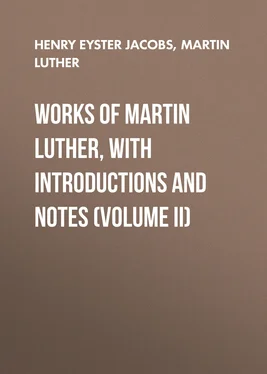Henry Eyster Jacobs - Works of Martin Luther, with Introductions and Notes (Volume II)
Здесь есть возможность читать онлайн «Henry Eyster Jacobs - Works of Martin Luther, with Introductions and Notes (Volume II)» — ознакомительный отрывок электронной книги совершенно бесплатно, а после прочтения отрывка купить полную версию. В некоторых случаях можно слушать аудио, скачать через торрент в формате fb2 и присутствует краткое содержание. Жанр: foreign_prose, foreign_religion, Философия, foreign_psychology, foreign_antique, на немецком языке. Описание произведения, (предисловие) а так же отзывы посетителей доступны на портале библиотеки ЛибКат.
- Название:Works of Martin Luther, with Introductions and Notes (Volume II)
- Автор:
- Жанр:
- Год:неизвестен
- ISBN:нет данных
- Рейтинг книги:3 / 5. Голосов: 1
-
Избранное:Добавить в избранное
- Отзывы:
-
Ваша оценка:
- 60
- 1
- 2
- 3
- 4
- 5
Works of Martin Luther, with Introductions and Notes (Volume II): краткое содержание, описание и аннотация
Предлагаем к чтению аннотацию, описание, краткое содержание или предисловие (зависит от того, что написал сам автор книги «Works of Martin Luther, with Introductions and Notes (Volume II)»). Если вы не нашли необходимую информацию о книге — напишите в комментариях, мы постараемся отыскать её.
Works of Martin Luther, with Introductions and Notes (Volume II) — читать онлайн ознакомительный отрывок
Ниже представлен текст книги, разбитый по страницам. Система сохранения места последней прочитанной страницы, позволяет с удобством читать онлайн бесплатно книгу «Works of Martin Luther, with Introductions and Notes (Volume II)», без необходимости каждый раз заново искать на чём Вы остановились. Поставьте закладку, и сможете в любой момент перейти на страницу, на которой закончили чтение.
Интервал:
Закладка:
The materials of the work are drawn from many sources,—from hearsay, from personal observation, from such histories as Luther had at his command, from the proceedings of councils and of diets; there are passages which would seem to bear more than an accidental resemblance to similar passages in Hutten's Vadiscus . All was grist that came to Luther's mill. But the spirit of the work is Luther's own.
For the general historian, who is concerned more with the practical than with the theoretical or theological aspects of the Reformation, the Open Letter is undoubtedly Luther's greatest work. Its rank outspokenness about the true condition of Germany, the number and variety of the subjects that it treats, the multiplicity of the sources from which the subject-matter is drawn, and the point of view from which the whole is discussed make it a work of absorbing interest and priceless historical value. It shows, as does no other single work of the Reformation time, the things that were in men's minds and the variety of motives which led them to espouse the cause of the Protestant party. Doctrine, ethics, history, politics, economics, all have their place in the treatise. It is not only "a blast on the war-trumpet," 97 97 So it was called by Johann Lang (Enders, II, 461).
but a connecting link between the thought of the Middle Ages and that of modern times, prophetic of the new age, but showing how closely the new is bound up with the old.
The text of the Open Letter is found in Weimar Ed ., VI, 404-469; Erl. Ed. , XXI, 277-360; Walch Ed. , X, 296-399; St. Louis Ed. , X, 266-351; Berlin Ed. , I, 203-290; Clemen I, 363-425. The text of the Berlin Ed._ is modernized and annotated by E. Schneider. The editions of K. Benrath (Halle, 1883) and E. Lemme ( Die 3 grossen Reformationsschriften L's vom J. 1520 ; Gotha, 1884) contain a modernized text and extensive notes. A previous English translation in Wace and Buchheim , Luther's Primary Works (London and Philadelphia, 1896). The present translation is based on the text of Clemen.
For full discussion of the contents of the work, especially its sources, see Weimar Ed. , VI, 381-391; Schäfer, Luther als Kirchenhistoriker , Gütersloh, 1897; Kohler, L's Schrift an den Adel . . . im Spiegel der Kulturgeschichte , Halle, 1895, and Luther und die Kirchengeschichte , Erlangen, 1900. Extensive comment in all the biographies, especially Köstlin-Kawerau I, 315 ff.
CHARLES M. JACOBS.
Lutheran Theological Seminary,
Mount Airy, Philadelphia.
AN OPEN LETTER TO THE CHRISTIAN NOBILITY OF THE GERMAN NATION CONCERNING THE REFORM OF THE CHRISTIAN ESTATE
To the
Esteemed and Reverend Master
NICHOLAS VON AMSDORF,
Licentiate of Holy Scripture and Canon at Wittenberg, my special and kind friend;
Doctor Martin Luther.
The grace and peace of God be with thee, esteemed and reverend dear sir and friend.
The time to keep silence has passed and the time to speak is come, as saith Ecclesiastes [Eccl. 3:7]. I have followed out our intention 98 98 Unserm furnchmen nach . See Introduction, p. 57.
and brought together some matters touching the reform of the Christian Estate, to be laid before the Christian Nobility of the German Nation, in the hope that God may deign to help His Church through the efforts of the laity, since the clergy, to whom this task more properly belongs, have grown quite indifferent. I am sending the whole thing to your Reverence, that you may pass judgment on it and, if necessary, improve it.
I know full well that I shall not escape the charge of presumption in that I, a despised monk, venture to address such high and great Estates on matters of such moment, and to give advice to people of such high intelligence. I shall offer no apologies, no matter who may chide me. Perchance I owe my God and the world another piece of folly, and I have now made up my mind honestly to pay that debt, if I can do so, and for once to become court-jester; if I fail, I still have one advantage,—no one need buy me a cap or cut me my comb 99 99 An ironical comparison of the monks' cowl and tonsure with the headgear of the jester.
. It is a question which one will put the bells on the other 100 100 i. e., Which one turns out to be the real fool.
. I must fulfil the proverb, "Whatever the world does, a monk must be in it, even if he has to be painted in." 101 101 The proverb ran, Monachus semper praesens , "a monk is always there." See Wander, Deutsches Sprichwörterlexicon , under Mönch, No. 130.
More than once a fool has spoken wisely, and wise men often have been arrant fools, as Paul says, "If any one will be wise, let him become a fool." [1 Cor. 3:18] Moreover since I am not only a fool, but also a sworn doctor of Holy Scripture, I am glad for the chance to fulfil my doctor's oath in this fool's way.
I pray you, make my excuses to the moderately intelligent, for I know not how to earn the grace and favor of the immoderately intelligent, though I have often sought to do so with great pains. Henceforth I neither desire nor regard their favor. God help us to seek not our own glory, but His alone! Amen.
Wittenberg, in the house of the Augustinians, on the Eve of St. John the Baptist (June 23d), in the year fifteen hundred and twenty.
To
His Most Illustrious and Mighty Imperial Majesty,
and to
the Christian Nobility of the German Nation,
Doctor Martin Luther.
Grace and power from God, Most Illustrious Majesty, and most gracious and dear Lords.
It is not out of sheer frowardness or rashness that I, a single, poor man, have undertaken to address your worships. The distress and oppression which weigh down all the Estates of Christendom, especially of Germany, and which move not me alone, but everyone to cry out time and again, and to pray for help 102 102 Evidently a reference to the Gravamina of the German Nation ; see Gebhardt, Die Grav. der Deutschen Nation , Breslau, 1895.
, have forced me even now to cry aloud that God may inspire some one with His Spirit to lend this suffering nation a helping hand. Ofttimes the councils 103 103 Councils of the Church, especially those of Constance (1414-18), and of Basel (1431-39).
have made some pretence at reformation, but their attempts have been cleverly hindered by the guile of certain men and things have gone from bad to worse. I now intend, by the help of God, to throw some light upon the wiles and wickedness of these men, to the end that when they are known, they may not henceforth be so hurtful and so great a hindrance. God has given us a noble youth to be our head and thereby has awakened great hopes of good in many hearts 104 104 Charles V. was elected Emperor in 1519, when but twenty years of age. Hutten expresses his "hopes of good" from Charles in Vadiscus (Böcking, IV, 156).
; wherefore it is meet that we should do our part and profitably use this time of grace.
In this whole matter the first and most important thing is that we take earnest heed not to enter on it trusting in great might or in human reason, even though all power in the world were ours; for God cannot and will not suffer a good work to be begun with trust in our own power or reason. Such works He crushes ruthlessly to earth, as it is written in the xxxiii. Psalm, "There is no king saved by the multitude of an host: a mighty man is not delivered by much strength." [Ps. 33:16] On this account, I fear, it came to pass of old that the good Emperors Frederick I 105 105 Frederick Barbarossa (1152-1100).
and II 106 106 Frederick II (1212-1250), grandson of Barbarossa and last of the great Hohenstaufen Emperors. He died under excommunication.
, and many other German emperors were shamefully oppressed and trodden under foot by the popes, although all the world feared them. It may be that they relied on their own might more than on God, and therefore they had to all. In our own times, too, what was it that raised the bloodthirsty Julius II 107 107 Pope Julius II (1503-1513). Notorious among the popes for his unscrupulous pursuit of political power, he was continually involved in war with one and another of the European powers over the possession of territories in Italy.
to such heights? Nothing else, I fear, except that France, the Germans and Venice relied upon themselves. The children of Benjamin slew 42,000 Israelites 108 108 Luther's recollection of the figures was faulty.
because the latter relied on their own strength.
Интервал:
Закладка:
Похожие книги на «Works of Martin Luther, with Introductions and Notes (Volume II)»
Представляем Вашему вниманию похожие книги на «Works of Martin Luther, with Introductions and Notes (Volume II)» списком для выбора. Мы отобрали схожую по названию и смыслу литературу в надежде предоставить читателям больше вариантов отыскать новые, интересные, ещё непрочитанные произведения.
Обсуждение, отзывы о книге «Works of Martin Luther, with Introductions and Notes (Volume II)» и просто собственные мнения читателей. Оставьте ваши комментарии, напишите, что Вы думаете о произведении, его смысле или главных героях. Укажите что конкретно понравилось, а что нет, и почему Вы так считаете.












